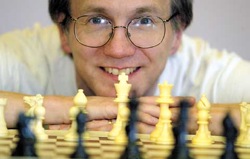The Chicago Open (which I wrote about in my last four blog entries) was not the only chess event that happened on Memorial Day weekend. In Stillwater, Oklahoma, there was big news in the chess grouposphere (a separate, parallel universe to the blogosphere), because National Master Brian Wall won the North American FIDE Open with a score of 8½ points out of 10!
Brian writes in his Yahoo! newsgroup, BrianWallChess, that it was his “most fun tournament ever,” and given that he is a multiple time champion of Colorado and a USCF Life Master, that is really saying something. Here he has posted a partial crosstable, with his name at the top for the whole world to see. Congratulations, Brian!
One thing I like about the North American FIDE Open is the name. It sounds so important, doesn’t it? It really sounds as if this ought to be the main event of the Memorial Day Weekend, and the Chicago Open should be just a sideshow. After all, Chicago is merely a city, while North America is a whole continent.
So did Loek van Wely, and the 22 other grandmasters who played in Chicago, take a wrong turn on the road to Stillwater? Well, maybe not. There’s also this little thing called prize money. Loek took home $10,200 for finishing first in Chicago, while Brian won $400 for finishing first in Stillwater. But did Loek have as much fun as Brian? That I can’t tell you.
Because all the grandmasters, international masters, and FIDE masters were in Chicago, Brian was actually the second-highest rated player in Stillwater, next to Pete Karagianis. Nevertheless, it isn’t your rating that wins you a chess tournament, it’s what you do over the board. Brian played his usual devil-may-care opening nonsense, sticking to an opening “strategy” of playing something different each round. In his five games with White, he opened 1. b3, 1. Nf3, 1. c4, 1. d4 and 1. e4. As Black, in round two, he played what he called the “Exxon Valdez/BP Oil Spill Opening,” a system that features the moves … Nc6, … f6, … d6, … e5, … h5, and … Nh6. I’m not sure if you can say the strategy actually worked, because he got himself into (and out of) a number of messes. Someone asked him how he kept winning lost positions, and he said his secret was “Diet and exercise.” I also think a positive mental attitude makes a big difference. Here’s how he pulled out a win in the ninth round:
Well, the game quickly got down to that horrible Tal-Keres pawn structure, I had
an isolated d-pawn, two doubled b-pawns and the Queens were even traded.
Rather horrid for winning chances but I remembered how Keres won, didn’t panic,
stayed active and somehow managed to ” Life’s leaden Metal into Gold
transmute.” I was channeling our new US Champion Kamsky, he is such a
nonemotional endgame grinder. Relentless.Whenever I get discouraged from the actual position in front of me I say to
myself, ” You may not like this position but do you really think your opponent
(Ryan Farell in this case ) could draw Kamsky from right here? Would a computer
get discouraged? Hell no! ” I fight that choking, drowning sensation I get every
game when my lower rated opponent has a higher rated position.It was not a matter of proving to Ryan before or after the game I was winning,
it was just a matter of squeezing the most out of my slim chances and leaving
the rest up to the winds of fate.
Beautifully put! By the way, this is the exact opposite of what I did against a young opponent in my last game at Chicago. I had lost faith in my position, and when my opponent offered a draw unexpectedly, I took it. It wasn’t necessarily the wrong decision; I was tired, and I had been eliminated from contention for any prize money many games earlier. But still, I like Brian’s attitude. Don’t give ’em a draw even if your position is worse.
The biggest game of the tournament, literally and figuratively, was Brian’s encounter with the top-rated Karagianis in round six. They played a 141-move (!) draw, reportedly the longest ever in Oklahoma tournament chess. I haven’t played over it yet, but I will be very intrigued to see what happened. Karagianis was on the defending side of a R+P versus R endgame where he apparently got to the Philidor position (a book draw) but was somehow hoodwinked out of it. The game went back and forth several times after that from drawn to won, but somehow or other it ended up as a draw. The game was played at a “FIDE time control” of game in 90 minutes with a 30-second per move time increment. I suspect that both players were living on the increment for many moves, and under those circumstances it’s hard even for masters to play the endgame right.
So Brian has fulfilled one of my New Year’s resolutions, which was to actually win an open chess tournament sometime this year. (Actually, I’m not sure whether that counts as a resolution or just a goal.) There’s a good moral here. Sometimes you can earn more glory and satisfaction by playing in your own town or city or region for less money, than you can by traveling to the big-name big-money tournament halfway across the country.



{ 1 comment… read it below or add one }
I was originally planning to say Hi for the first time to Dana Mackenzie at the 2010 Chicago Open but decided to play in the NAO instead. Thanx for the writeup, I distributed it to my emails lists and Chess_Improvement@Yahoogroups.com and UnorthodoxChessOpenings@Yahoogroups.com